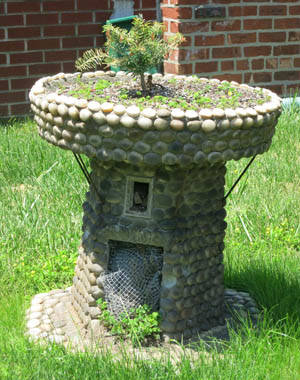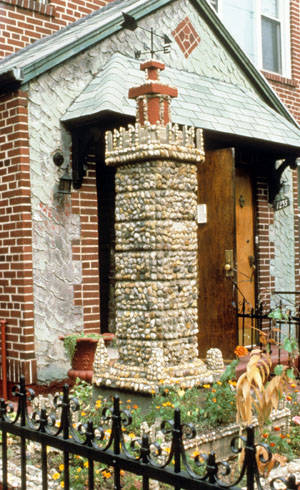Andrea Cuomo, Immigrant Pebble Artisan
In the height of the 2014 campaign for New York State governor, the New York Times published an article analyzing a video ad for Governor Andrew Cuomo’s reelection bid. The ad’s political message highlighting Cuomo’s claim to have lowered property taxes during his first term in office was not what grabbed my attention. Instead my eyes lingered on the opening shots of the pebble-studded object crafted by the governor’s immigrant grandfather Andrea. The first thing Cuomo tells the viewer is that his paternal grandfather Andrea built the “castle” (also the name of the ad) “50 years ago for the yard in his first home.”
Andrea was raised in Nocera Inferiore (Salerno province) in Campania and came to the United States in 1926. This was the man that Mario Cuomo described as having “thick callouses on both his hands” in his famed speech at the 1984 Democratic National Convention.
Here was another direct link to an Italian-American craftsperson using beach pebbles to decorate his cement creation. As I have documented on this blog there are scores and scores of flowerpots on front porches across Brooklyn and I have yet to determine their origins. But there are also other unique objects similar to that of Andrea Cuomo’s creation that I have traced, more or less, to Italian Americans—a tower, a lighthouse, a shrine—installed in front yards in Brooklyn.
Andrew Cuomo writes evocatively about his grandfather Andrea’s pebble creations in his 2014 political memoir All Things Possible: Setbacks and Success in Politics and Life, which I have excerpted here:
My grandfather was a talented artisan. He especially enjoyed building with stone. He had built from brick and marble a large outdoor stove with a chimney.
Another project was a concrete fishpond that was probably all of twelve feet in diameter but to me, as a boy, it was the Atlantic Ocean. The pond was filled with clear water so you could see the gold fish. He created a waterfall, powered by a garden hose, which cascaded into the pond.
At either end of the pond were two stone castles. These were my favorites. He built them in his basement during the winter from stones he’d picked up at the beach during the summer. Each stone was round, approximately two inches in diameter, whites and off-whites, and smooth from the water and sand. With these stones he fashioned four-foot-tall miniature-cement-and stone castles. He labored for days on them and was proud of his simple but impressive creation.
I was taken with them and could spend hours playing with the fish and just imagining. I thought the whole affair was grand and my grandfather was Michelangelo. This was his expression of this artistic side, a side of his personality that he had the opportunity rarely to show. Life was too practical for him. He was an Italian laborer, a delicatessen operator seven days a week—who had time for art or creativity? It was a luxury—and his life had no space for luxuries. But now in his later life he had his artistic flourish and it was enough for him.
My grandfather Andrea left Tramonti [his wife’s Immacolata’s hometown Salerno province] in southwestern Italy in 1926 and came to his country, a skilled craftsman with no prospects and a wife and baby back home. He took a back-cracking job laying sewers in New Jersey to earn the money to bring them to America. It took him twenty–three years to accomplish his goal: owning his own single-family home with a yard.
Andrew Cuomo moved one of his grandfather’s two castles to his home in, of all places, New Castle, New York. His memoir includes a photograph of his parents Mario and Matilda posing on a Manhattan apartment building balcony with what appears to be the second castle built by Andrea.
Both father and grandson understood and appreciated the importance of Andrea’s “simple but impressive creation,” uprooting and transporting them to their new homes. I can help but wonder who else has preserved other examples of this Italian-American folk art.
(Thanks to Anthony Scotto for his help on this blog post.)






































i-Italy
Facebook
Google+
This work may not be reproduced, in whole or in part, without prior written permission.
Questo lavoro non può essere riprodotto, in tutto o in parte, senza permesso scritto.